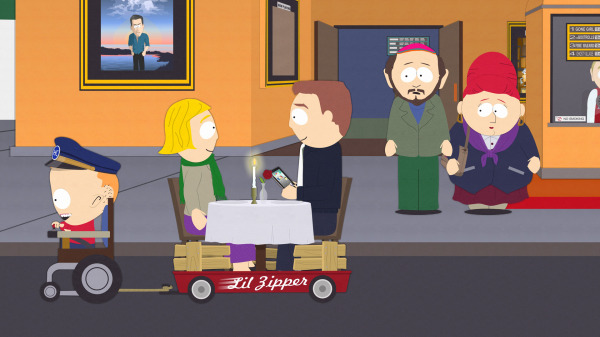‘South Park’ on ride-sharing services: Let free market decide

GOT A TAXI?: “South Park” creators Trey Parker and Matt Stone take aim at critics of shared-ride services in the latest episode of their long-running animated Comedy Central series.
By Adam Tobias | Wisconsin Reporter
“South Park” is hilarious. Like, insanely hilarious.
Is the humor in Trey Parker and Matt Stone’s long-running animated series sophomoric, obscene and vulgar? Sure, and it always has been.
But underneath that juvenile comedic goodness lies brilliant and biting social commentary that never takes the foot off the accelerator when poking fun at current events, popular culture and American politics.
Parker and Stone’s latest episode, “Handicar,” shines the spotlight on a controversial topic that has already been covered at length by several of my Watchdog colleagues, from Alabama to New Mexico to Pennsylvania to Virginia.
That would be the battle between traditional cab companies and new ride-sharing startups like Uber and Lyft, which employ individual contractors to provide shared transportation, especially among commuters.
That same conflict comes to the town of South Park when the mentally-challenged Timmy starts a new shared-ride service with his wheelchair and little red wagon, much to the chagrin of local cab drivers and car dealers.
WATCH THE ENTIRE EPISODE OF “HANDICAR” HERE
Complaining that Timmy is taking away all their business because Handicar is cheaper and more convenient, the cabbies look to the mayor and police to shut their competition down. They also resort to sneaking into Timmy’s bedroom window to relay a message from the union, one that involves breaking the little kid’s legs with baseball bats.
But Mimsy, a different mentally challenged boy who is the butt of many jokes, doesn’t quite understand that logic.
Instead, Mimsy recommends the cab drivers consider cleaning their puke-filled cars and better their customers’ experiences so they can compete with Handicar’s popularity in the marketplace. He even goes on to say that maybe ride-sharing is a kind of economic natural selection where the most diligent workers are weeding out the useless ones.
As usual, spot on analysis, “South Park.”
I understand why taxi operators are all up in arms over the emergence of shared-ride services. Because most governments regulate the number of cabs on the road through a strict and expensive licensing system, I get the argument that ride-sharing companies don’t have to play by the same rules. And then there’s the whole losing money and customers thing.
But the problem is, as Lyft co-founder John Zimmer puts it, shared-ride providers are forced to navigate through conflicting regulatory hurdles because of a patchwork of laws created by different levels of local and state government. Many proponents also maintain that ride-sharing firms shouldn’t be subject to the same guidelines as cabs, in part, because they only pick up customers who request a driver, and not anyone off the street.
In the end, all of these headaches would go away if public officials simply dropped all the burdensome regulations for both traditional taxis and shared-ride companies.
Like “South Park” so elegantly suggests, it should be up to the free market — and not the government — to decide if ride-sharing is here to stay or if it will be a thing of the past.
We all deserve that choice, and that’s no laughing matter.







